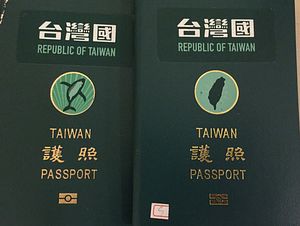A petition requesting that Taiwan’s time zone – currently the same as China’s – be changed to match Japan and South Korea’s has gained the necessary 5,000 signatures and the government thus has to respond. The time zone change is meant to differentiate Taiwan from the other side of the Strait. Different time zones could disrupt the tight cross-strait economic ties, one of Beijing’s major sources of leverage over Taipei, to a certain extent. However, the highly developed cross-strait relationship is the outcome of the similar languages and cultures on the two sides, not just the official policies of both sides. An hour time difference is unlikely to compensate for those powerful factors.
By the same token, some activists issued “Republic of Taiwan” passport stickers last year, which Taiwanese could use to cover the phrase “Republic of China” on their passports. The intention again is to highlight Taiwan’s independence from China. While there was a debate over whether such stickers would cause problems for users during their overseas travels, using stickers does not change the reality of the official title of the republic.
Such symbolic efforts signify not only a certain popular preference regarding national identity but also the frustration of the pro-independence political forces on Taiwan. Despite Taiwan’s status of de facto independence, as elucidated by several important political figures, such as former President Lee Teng-hui, current President Tsai Ing-wen, and Premier William Lai, the fact of Taiwan’s abnormal statehood is undeniable. The Chinese nature of the ROC, enshrined in both Taiwan’s official name and its constitution, provides Beijing with enhanced legitimacy for its territorial claim over Taiwan and resulting efforts toward unification. Consequently, those seeking full independence from China have evolved into a political force in Taiwan, as evidenced in public opinion polls in recent years — even between 2008 and 2016, when the Kuomintang (KMT, meaning the Chinese Nationalist Party) administration was carrying out its China friendly policy.
Understandably, those who support Taiwanese independence had heightened expectations when the Democratic Progressive Party (DPP), with its pro-independence legacy, returned to power last year. However, Tsai administration’s position of maintaining the status quo has not lived up to those expectations. Based on Taiwan’s geopolitical realities — China’s rise and Taiwan’s growing military inferiority, Taiwan’s sluggish economic growth, and diverse national identities within Taiwan — it is reasonable for Taipei to hold to a moderate position on cross-strait relations. As a major party, the DPP naturally has to consider the majority of voters’ political preference, retaining the status quo, more than pro-independence. Putting aside China’s open threats to attack should Taiwan move toward independence, tight cross-strait economic ties mean that pursuing a pro-independence policy would take a heavy toll on Taiwan’s prosperity. That obviously discourages support for pro-independence at the polls, and means pro-independence factions are stuck with disappointment.
According to conventional wisdom, the pro-independence bloc would force the DPP administration to move forward, but pressing the ruling party pose a dilemma for these voters. Small amounts of criticism may not work, but taking strong steps against the DPP — such as refusing to vote — may backfire by benefiting the party’s political rival, the more China-friendly KMT. Furthermore, it is not easy to conduct a sophisticated lobbying campaign to exert adequate influence on the DPP, as there is no uniform or effective organization in the pro-independence camp. Of course, people and activists who support Taiwanese independence can gradually learn how best to deal with the DPP or even create their own political alternatives, but neither goal can be achieved quickly.
By contrast, setting up symbolic targets — such as passport stickers and a time zone change — with relatively low requirements for organization and resources, can emotionally and immediately satisfy many independence supporters. In other words, those symbolic moves can be outlets for the pro-independence faction to vent their disappointment or frustrations with the Tsai administration. Such a casual or unconventional approach may attract more domestic supporters, particularly among younger generation, because participants can support the pro-independence agenda in an easy and safe way. The organizers behind such symbolic efforts, meanwhile, may accumulate political capital or perhaps even donations or other financial benefit, which would be valuable for future endeavors such as running election campaigns.
Undeniably, such symbolic events demonstrate a certain level of popular support, but can have side effects as well. The barriers for Taiwan to become a normal sovereign state are twofold: its own unique form of Chinese statehood, plus Chinese pressure. To overcome either would take significant reforms and efforts in the political establishment, not just popular campaigns. Given the constraints of time, energy, and resources, more symbolic efforts translate to refer to less effort devoted to on practical means, such as engaging the DPP on substantial issues.
When it comes to cross-strait relations, the inability of the pro-independence political forces to gain traction even under the DPP government will stabilize the situation in the short-term. Taipei clearly has little desire to challenge the status quo. However, in the long term, a complacent acceptance of the status quo may put Taiwan’s de facto independence or even survival in peril in the long term, as China continues rising.
If symbolic steps gradually become the main aim of the movement, “Taiwan Independence” may eventually become as empty of a goal as “retaking the Mainland,” the Chiang Kai-shek regime’s official agenda during the Cold War.
Shang-su Wu is a research fellow in the Military Studies Program of the S. Rajaratnam School of
International Studies (RSIS), Nanyang Technological University.

































